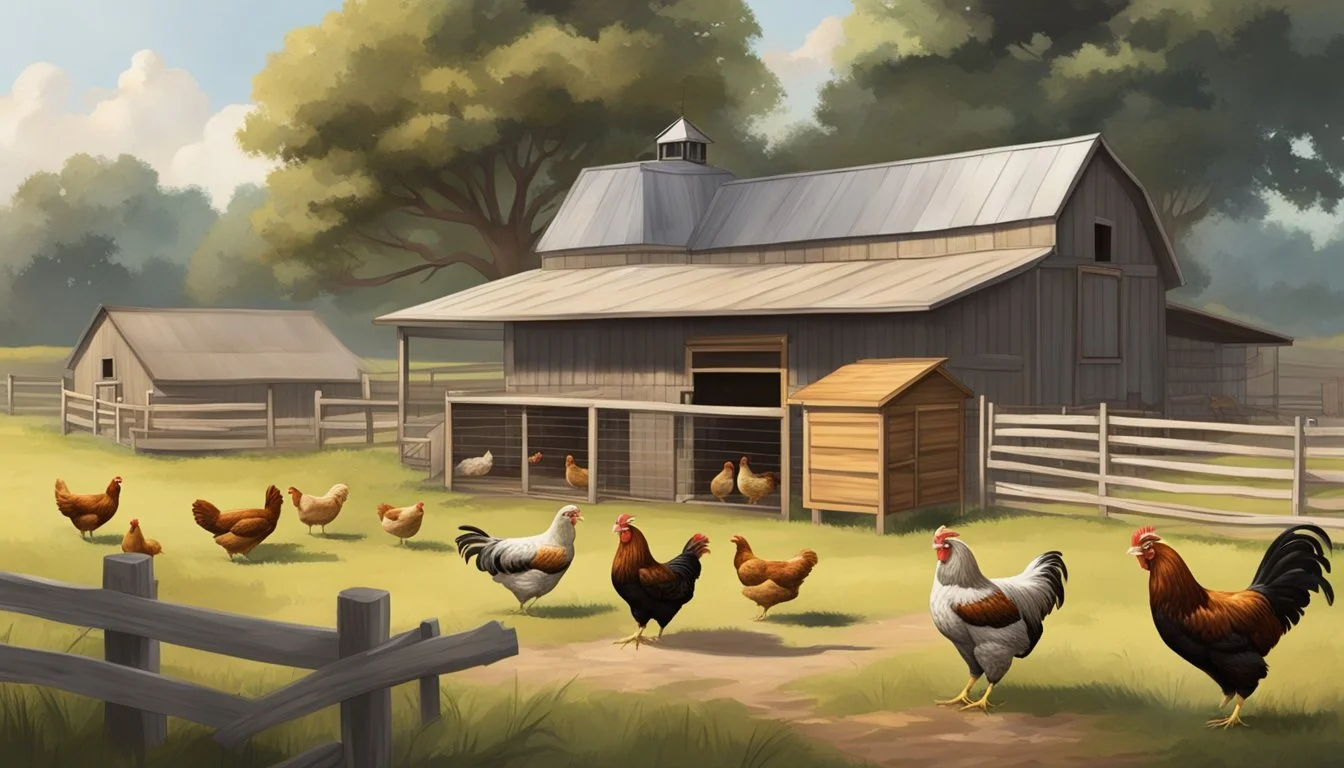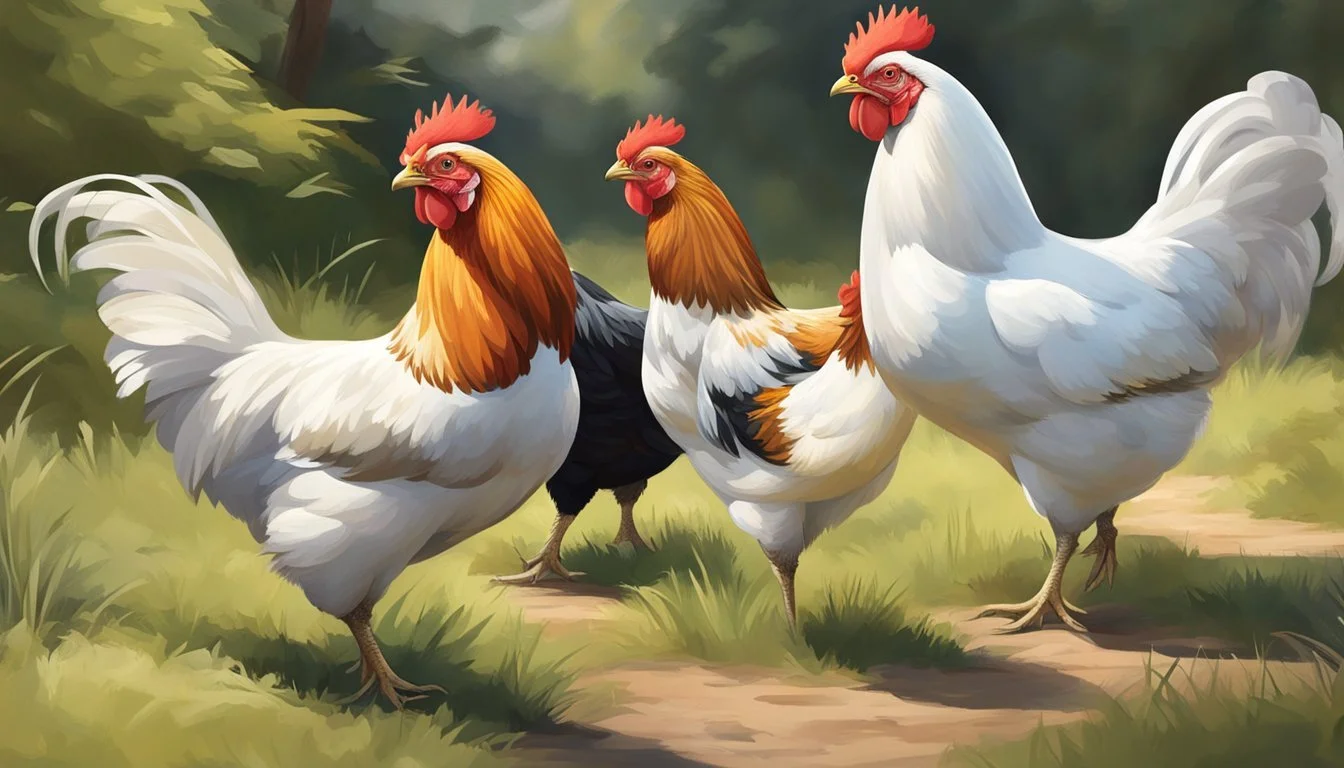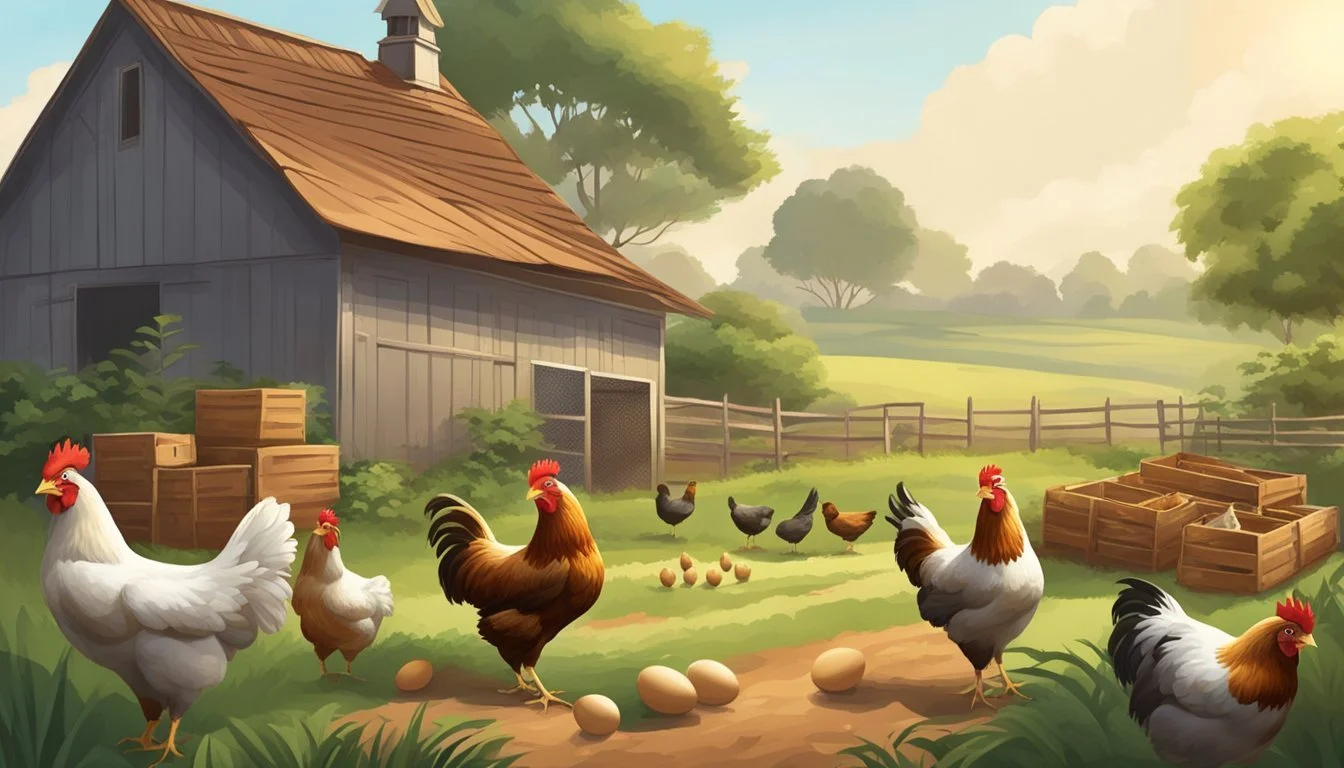Raising Heritage Breed Chickens in Texas
A Guide to Sustainable Poultry Farming
Raising heritage breeds of chickens has gained popularity in Texas for those looking to reconnect with traditional methods of poultry farming. These specific poultry breeds refer to strains of chickens that were commonly raised before industrial agriculture shifted towards more rapidly maturing birds. These breeds, such as the Ancona, Plymouth Rock, and Rhode Island Red, are valued for their ability to thrive in free-range settings, their longer productive lifespans, and their natural mating capabilities. In Texas, with its diverse climate ranging from arid deserts to humid coastal areas, raising these breeds requires an understanding of their specific needs and adaptations to the environment.
Heritage chickens typically require more time to reach maturity and are often raised for both their egg-laying abilities and meat quality. They are known for their robust health and the resilience they bring to a homestead. In the Texan context, prospective poultry keepers must pay special attention to breed selection, ensuring the chosen breeds can cope with the local climate, which can be a significant challenge during the hot summers.
Texas law also plays a crucial role in the keeping of chickens, as local ordinances dictate aspects such as coop construction, space requirements, and whether roosters are permitted. Consequently, it's imperative for enthusiasts to familiarize themselves with relevant regulations to ensure the welfare of their flock and compliance with legal standards. This foundational step helps to create a sustainable and responsible heritage poultry farm.
Understanding Heritage Breeds and Their Importance
The heritage chicken breeds represent a vital piece of sustainable agriculture, embodying a genetic legacy important for diversity and adaptability in poultry farming.
Defining Heritage Chicken Breeds
Heritage chicken breeds are defined by specific criteria set by organizations such as the American Poultry Association. To be designated as a heritage breed, the chicken must be from a line that was established prior to the mid-20th century. These breeds are characterized by their slow growth rate, ability to mate naturally, and long, productive outdoor life. It's essential to note that a true heritage chicken is hatched from a heritage egg sired by recognized standard breeds.
Benefits of Raising Heritage Breeds
Raising heritage chicken breeds offers a host of benefits. Firstly, these breeds often exhibit strong foraging behaviors, making them an ideal choice for pasture-based systems. Their longevity and resilience contribute to sustainability, reducing the need for frequent replacement. These breeds also help maintain genetic diversity within poultry populations, which is crucial for the health and adaptability of flocks to various environments and potential diseases.
The Role of the Livestock Conservancy
The Livestock Conservancy, formerly known as the American Livestock Breeds Conservancy, plays a pivotal role in the preservation of heritage chicken breeds. They strive to prevent breeds from falling into extinction by maintaining genetic resources and promoting heritage breeds. The Conservancy provides resources and support to farmers and educates the public on the importance of these breeds, ensuring that the nature and sustainability of heritage chickens are retained for future generations.
Selecting Breeds for a Texas Homestead
In Texas, the climate and local resources dictate the best choices for chicken breeds on a homestead. It is crucial to select breeds that thrive in Texas's hot and cold climates, ensuring the well-being and productivity of your planned backyard flocks.
Climate Considerations in Texas
Texas weather ranges from hot and humid in the east to dry and arid in the west. Buff Orpingtons are well-suited due to their adaptability to various climates, including the Texas heat. Meanwhile, Rhode Island Reds and Plymouth Rocks are hardy breeds that can manage the temperature fluctuations typical in Texas, showcasing good heat tolerance and cold resistance.
Choosing the Right Heritage Breeds
Heritage breeds are renowned for their perseverance and traditional qualities. They often display better foraging abilities and adapt more readily to free-ranging, a valuable trait for Texas homesteaders. Breeds such as Speckled Sussex and Delaware chickens are considered excellent foragers and provide consistent egg laying. The Rhode Island Red is another heritage breed known for its egg production and is a robust option for Texas homesteads desiring a balance between egg-laying and meat production.
Highlighting Texas-Friendly Chickens
For those seeking a specific breed of chicken that is fit for Texas, here are some top heritage breed recommendations. The Buff Orpington is known to be friendly and docile and is good for egg production. The Plymouth Rock is recognized for its suitability for both meat and eggs; it is sturdy and docile. The Speckled Sussex are great foragers, friendly, and produce a fair number of eggs. The Delaware is a good dual-purpose breed with a calm temperament and good meat quality. The Rhode Island Red is excellent for egg production and is hardy in different climates. These breeds have been consistently praised for their ability to prosper in the Texas environment, making them ideal choices for local homesteaders.
Raising Heritage Chickens: Practical Guidelines
When raising heritage chickens in Texas, it's essential to tailor their care to the specific needs of these breeds. They require a diet rich in nutrients, appropriate housing, and vigilance towards keeping healthy birds to help them thrive.
Feeding and Nutrition
Heritage chickens benefit from a balanced diet that meets their particular needs, and it is critical to provide chicken feed that offers a mix of grains, proteins, and essential minerals. Chick starter feed should be high in protein, with a content of 20-24%, to support the rapid growth and development of young chicks. As chickens grow, they require grower feed, which has a slightly lower protein content of 16-18%, to continue their development into healthy adult birds. For adult chickens, particularly those laying eggs, layer feed is appropriate; it has a protein content of 15-18% and includes added calcium to support eggshell production. Regardless of the life stage, free access to clean water is a non-negotiable requirement for the health and well-being of the chickens.
Housing and Space Requirements
When constructing a coop for heritage breed chickens, it's important to ensure that it is spacious enough to accommodate the full-grown size of the birds while also keeping them secure to serve as pest control. Each chicken requires at least 3 square feet of space inside the coop and 8-10 square feet in the chicken run. For nesting, one nest box should be provided for every 4-5 hens, with each box measuring at least 12 inches by 12 inches. Additionally, each chicken should have 6-10 inches of perch for roosting space. The overall coop size should be calculated based on the number of chickens; for example, a flock of 5 chickens will need at least 15 square feet inside the coop. Proper ventilation in the coop is vital to prevent respiratory issues, but it's important to ensure that the space is draft-free, especially during the Texas winters, to keep the chickens comfortable and healthy.
Health and Wellness
To maintain the health of heritage chickens, it is crucial to practice preventive care and to respond promptly to any health issues that may arise. This begins with setting up a clean brooder for the chicks to prevent early onset of illness. As the chickens mature, it is important to regularly check for parasites and diseases. Heritage breeds usually need more space compared to other breeds, and they thrive on foraging, which is integral to their health and well-being. Therefore, providing them with ample outdoor space to engage in these activities is advantageous. Additionally, dust bathing areas should be made available as they are a natural method for controlling parasites.
Observing the chickens in their chicken coops or while out foraging in the fields is important. This is essential to look for any signs of illness or distress is essential for early detection of health problems. When it comes to parasite control, it's important to apply treatments as required, making sure to adhere to the guidelines provided with the products. Following a vaccination schedule recommended by a veterinarian is also key in preventing disease. Using leg bands can assist in easy identification of individual birds, which is helpful for tracking health issues within the flock. By integrating these health management practices with information specific to the breed, you can help ensure that your heritage chickens remain healthy, productive, and well-suited to their environment.
Reproduction and Breeding Strategies
In Texas, raising heritage breed chickens requires an understanding of their natural reproductive behaviors and strategic breeding practices to maintain the vigor of the flock and establish your very own breeding program.
Understanding Broodiness and Reproduction
Heritage chickens often exhibit a tendency known as broodiness, where the hens have a natural inclination to sit on and hatch their eggs - making each hen an excellent layer. Recognizing and managing broodiness is vital, as a broody hen can influence the incubation period and success of hatching. Eggs are the cornerstone of reproduction, and heritage breeds generally produce them less frequently but with greater resilience compared to commercial breeds.
Selecting for Desired Traits
Selective breeding in heritage chickens involves a deliberate process where both professional and backyard chicken breeders choose individuals that exhibit desirable characteristics and genetic potential for reproduction. Key traits that are often sought after in these birds include hardiness, longevity, and a strong egg-laying capacity. Breeders meticulously select for these attributes with the goal of improving the flock's resistance to local diseases, their ability to produce high-quality eggs, and their adaptation to the Texas climate. By focusing on these specific traits, heritage chicken farmers aim to cultivate a flock that is not only productive but also well-suited to thrive in the particular environmental conditions they are raised in.
Naturally Mating vs. Artificial Insemination
The breeding of heritage chickens typically occurs through naturally mating behaviors, allowing adult birds to engage in instinctive courtship and reproduction. This supports genetic diversity and robust health. On the other hand, artificial insemination can be used when precision breeding is desired or to overcome mating difficulties but is less common in small-scale operations. It must be done with expertise and understanding of chicken genetics to be effective.
By focusing on broodiness, specific traits, and natural mating, Texans can raise heritage chickens that are not only suited to their environment but are also productive and genetically sound.
From Farm to Market: Utilizing Heritage Chickens
Raising heritage chickens in Texas presents a unique set of challenges and opportunities, from breeding for quality meat and eggs to marketing these birds to consumers who value sustainable practices.
Breeding for Meat and Egg Production
In Texas, heritage breeds are highly valued for their dual capabilities, serving as both quality meat birds and producers of nutritious eggs. These dual-purpose birds are particularly favored for their versatility, providing a reliable source of rich, brown eggs while also reaching a suitable market weight for meat production. Although they tend to grow more slowly than some other breeds, this gradual growth rate is often associated with better overall health and a longer lifespan for the birds. However, it's important for farmers to carefully manage these characteristics to ensure that productivity remains high and market demands are met. When it comes to egg production from these heritage breeds, one can expect a less frequent but dependable egg-laying schedule. As for meat production, the goal is to achieve the optimal market weight over a longer period, which is believed to contribute to the flavorful quality of the meat.
Marketing Heritage Chickens
Effectively marketing heritage chickens hinges on the clear communication of their inherent value to potential customers. Farmers are encouraged to accentuate the sustainable farming practices involved in raising these birds, emphasizing their natural foraging behaviors and outdoor living conditions. Additionally, the health benefits associated with the high-quality meat and eggs produced by heritage breeds, which are a direct result of their lifestyle, should be promoted. It's also crucial to inform consumers about the ethical raising practices employed, which allow the chickens to lead more natural lives, aligning with higher animal welfare standards. By leveraging a diverse array of channels, including farmer's markets and social media platforms, farmers can extend their reach to a broader audience. This strategy enables them to connect with consumers who value these attributes and are willing to pay a premium for the quality and ethical considerations that heritage chickens represent.
Ethical Considerations
When raising heritage breed chickens, farmers are tasked with carefully considering the ethical implications of their farming practices. This includes ensuring that there is adequate space available for the chickens to forage and exhibit natural behaviors, which is crucial for their wellbeing. Additionally, health management should be a priority, with a focus on preventive care and minimizing interventions to maintain the welfare of the birds. A commitment to these ethical practices is not just about the wellbeing of the chickens; it also has a significant impact on consumers who are increasingly seeking out responsibly-raised poultry. This conscientious approach to farming can help build trust with consumers who value animal welfare and sustainable farming methods.
More Bang for Each Cluck: Heritage Breed as Ideal Poultry Mainstays in Texas
The resurgence of heritage chicken breeds in Texas reflects a growing appreciation for sustainable agriculture and a return to traditional farming practices. These hardy, versatile breeds offer Texans the opportunity to experience the rich flavors and nutritional benefits of poultry raised as it was in the past. The careful selection of breeds suited to the Texan climate, along with a commitment to ethical farming practices, ensures that these chickens can thrive and contribute to a more diverse and resilient agricultural system.
Raising heritage chickens is not merely about producing food; it's about preserving history, supporting genetic diversity, and fostering a closer connection with our agricultural roots. By adhering to the principles of natural breeding, proper care, and ethical management, Texas farmers are not only providing their communities with high-quality poultry but also playing a crucial role in the conservation of these irreplaceable breeds.
The success of heritage chicken farming in Texas serves as a testament to the viability of combining old-world breeds with modern sustainable farming techniques. This approach to agriculture promises to enhance the welfare of the animals, satisfy the ethical considerations of consumers, and safeguard a treasured piece of our collective heritage for future generations. Whether for eggs, meat, or simply the joy of maintaining a piece of living history, heritage chickens in Texas represent a flourishing chapter in the story of American agriculture—one that is sure to continue as more people discover the benefits and pleasures of raising these remarkable birds.





